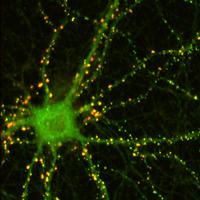| Sunday, April 13, 2003 |
| Weblogs and Neurons |
 L'oeil de Mouche comments (in French) on weblogs working like neurons. A weblog links with other sites in a similar fashion as a neuron does. The links are potentials for action. Something might or might not come out of them. They might or might not be followed. They might or might not add up to any coherent picture of anything. All the incoming data to a neuron do not necessarily add up to that neuron producing an outgoing signal. But if the sum of the incoming potentials cross a certain threshold, a new outgoing signal is generated. L'oeil de Mouche comments (in French) on weblogs working like neurons. A weblog links with other sites in a similar fashion as a neuron does. The links are potentials for action. Something might or might not come out of them. They might or might not be followed. They might or might not add up to any coherent picture of anything. All the incoming data to a neuron do not necessarily add up to that neuron producing an outgoing signal. But if the sum of the incoming potentials cross a certain threshold, a new outgoing signal is generated.
If several neurons are in sync, suddenly their signal starts being detectable. Multiple weblogs focusing on the same matter adds up to a noticable resonance - a synergy. That is like the concept of 'synaptic plasticity'. Hebb's learning postulate says essentially: Whenever neuron A fires, and neuron B fires soon afterwards, the synaptic efficacy increases.So, if two neurons are active at roughly the same time, the connection between them is strengthened. Likewise, if several weblogs happen to be focusing on the same subject at roughly the same time, the connections between them get strengthened. For that matter, it generally works like that between people. If you and I often happen to be activated in a certain way at the same time, like being interested in the same subject at the same time, or having similar experiences, and we notice that, chances are we'll have a stronger link between us in the future. It will be more likely that I'll check in with you before others who have less of a history of being in sync with me. But, indeed, in the human body the neurons are part of an organism with a common purpose, of making that organism function well. Whereas weblogs and people having chance encounters do not have a pre-defined common purpose. The connections perhaps serve to discover shared purposes, rather than just carrying out existing purposes more efficiently? [ Organization | 2003-04-13 16:00 | 1 comment | PermaLink ] More > |
| The Art of Lying in Politics |
 From Abstract Dynamics William Blaze writes: From Abstract Dynamics William Blaze writes:"The Bush Administration's media manipulation skills never ceases to amaze me. As the war in Iraq skewers away from the chickenhawks dream plans its starting to become clearer just how the Karl Rove media technique works. Its all pretty simple really, it can be broken down into 3 steps:He's right. Works like a charm in broadcast media, when speaking to large numbers of people who are only going to pay attention for a few minutes anyway. Works much less well on the net, where people can amplify the discrepancies. But it works horribly when dealing with other governments that most all have the intelligence resources to be able to add up the facts on their own. [ Politics | 2003-04-13 21:26 | 1 comment | PermaLink ] More > |